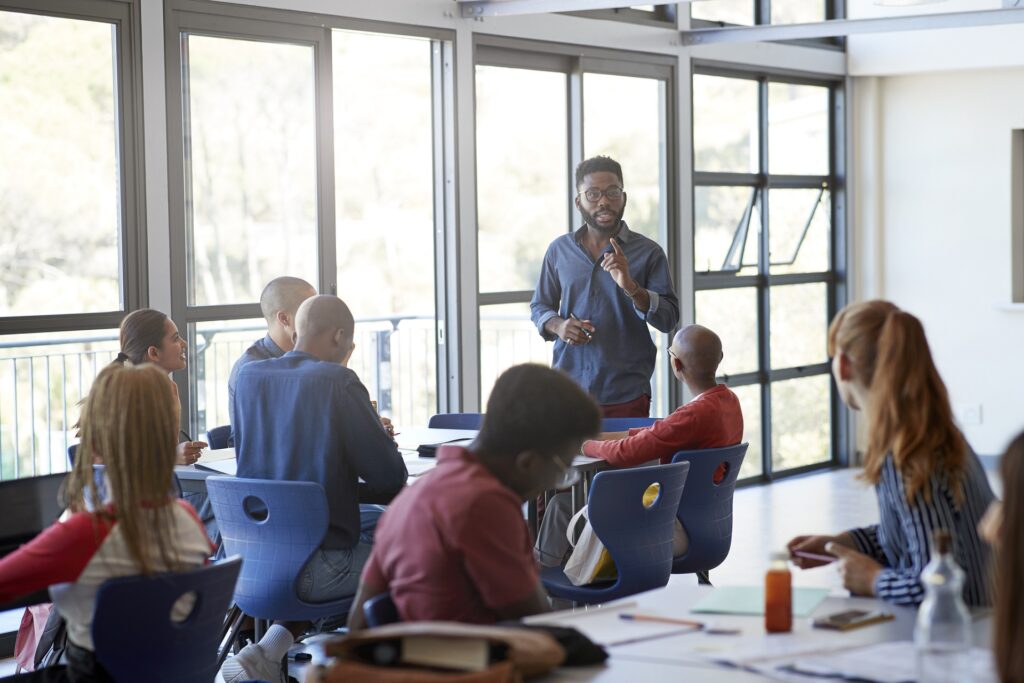With its youthful and dynamic population, Africa holds immense promise for the future. However, this potential can only be realized with access to quality education, and that begins with a sufficient number of skilled teachers.
Discover how SAP is powering equitable access to economic opportunity, education and employment, and the circular economy
This basic education predicament also affects young people’s acquisition of future skills — a formidable barrier to their employment prospects and potential. It is deeply disheartening that statistics indicate that more than 72 million youth in Africa are not in education, employment, or training. The majority of them young women.
In addition, while the global literacy rate stands at 90%, the average in Africa stands at approximately 70%. Apart from traditional literacy skills like reading and writing, it is crucial to acknowledge that fundamental digital literacy is no longer optional; it’s a necessity. It is the key that unlocks understanding, engagement, and prosperity in our interconnected world. These competencies extend beyond mere instruments for developing systems, software, and applications; they are enablers of critical thinking, creative problem-solving, and innovation.
According to a report from the International Finance Corporation (IFC), approximately 230 million jobs in sub-Saharan Africa will demand digital skills by 2030. While these figures may seem daunting, they also fuel our desire to continue to innovate and drive greater change, while reflecting on the profound impact of SAP’s philanthropic efforts.
Equipping Teachers with 21st Century Skills
Spearheaded by SAP in 2015 as part of its social investments to drive sustainable growth in Africa, Africa Code Week is a digital skills development initiative that has benefited millions of young Africans thus far. In 2022 alone, the Africa Code Week program actively engaged more than 2.6 million participants, equipping them with indispensable 21st century skills. Through an impressive tally of 37,121 workshops spanning the continent, it is encouraging to note that 48% of participants were female, furthering our commitment to gender equality. We also extended this transformative opportunity to nearly 10,000 young individuals with special needs, nurturing their growth and potential.
While this program has made remarkable strides, challenges persist. Without teachers who can impart 21st century learning skills to students, the continent risks creating a digital divide that could stifle economic growth and limit opportunities for its young population. The Women Empowerment Program within Africa Code Week is making a significant impact in this regard. This continuing professional development program equips African female teachers and educators in computer science and STEM with the skills and knowledge they need to successfully teach, inspire, mentor, and prepare girls for tomorrow’s tech workplace.
The program thereby supports the ambitious plans of Africa Code Week to transform the continent’s education system by including digital literacy in national curricula — in line with the work of United Nations Sustainable Development Goals (UN SDGs) 4, 5, and 17.
Additionally, Train-the-Trainer sessions at Africa Code Week are an integral component of the program’s mission to equip educators with the knowledge and skills needed to teach coding and digital literacy to students across the continent. These sessions serve as a capacity-building initiative designed to create a network of skilled trainers who can in turn train teachers and students in their local communities.
By providing educators with specialized training in coding and digital literacy, they can enhance their teaching capacity. The workshops also equip educators to deliver high-quality instruction in technology-related subjects, which are increasingly important in the 21st century classroom. In addition to this, educators are empowered to go beyond traditional teaching methods. They learn how to incorporate innovative and technology-driven pedagogical approaches into their classrooms. This not only improves the learning experience for students, but also makes teaching more engaging and relevant.
Looking Ahead
As we reflect on the significance of World Teachers’ Day 2023, it is important to remember that teachers are the torchbearers of knowledge, hope, and progress. By championing equal access to education, we recognize that future skills play a pivotal role in shaping the trajectory of tomorrow’s workforce.
By addressing the teacher shortage, upskilling educators in advanced 21st century learning, and promoting digital literacy, we can uplift Africa’s youth to shape a brighter future. Together, we can turn the global imperative to reverse the teacher shortage into a reality that benefits us all.
Claire Gillissen-Duval is head of SAP CSR for EMEA and MEE.
Connect with and follow SAP News on LinkedIn

